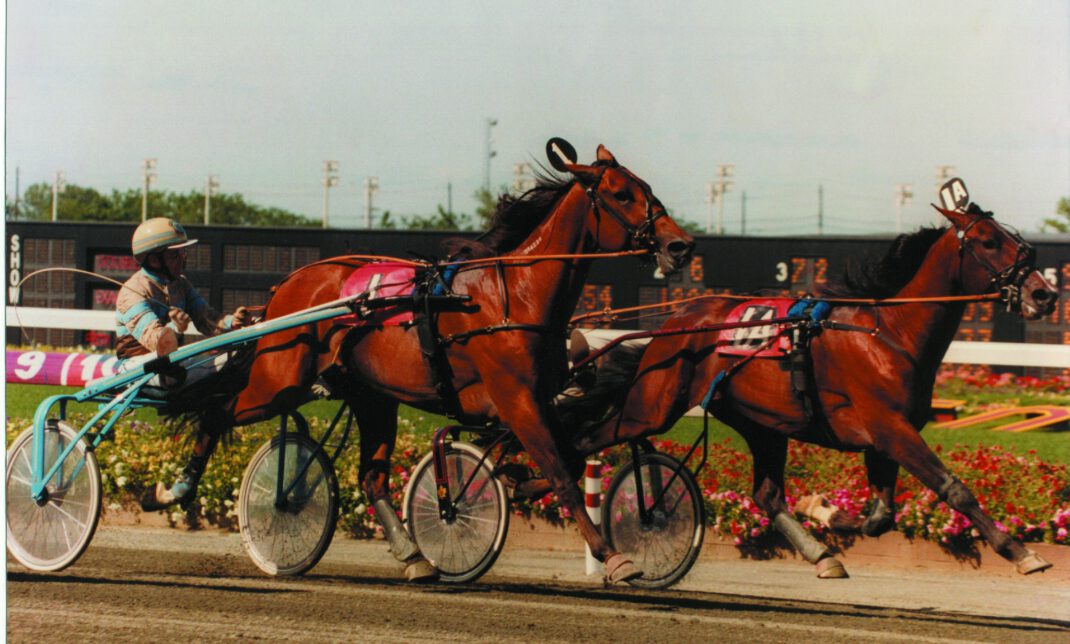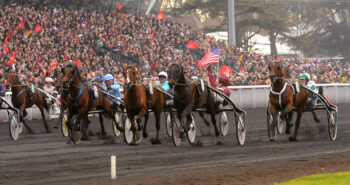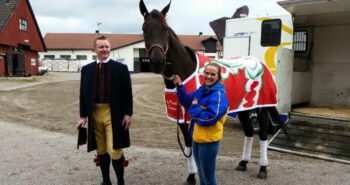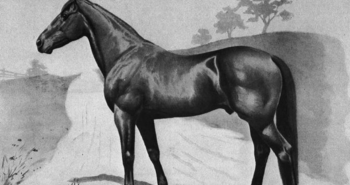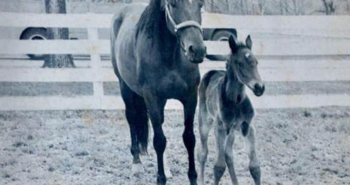He was the unlikeliest of Hambletonian heroes. His breeder felt forced to buy his dam despite not wanting her, and also felt cheated when he first saw his new broodmare. His trainer cheered for another horse. His driver felt so sure he couldn’t win that he didn’t even invite his family. But in the 1992 Hambletonian final, Mickey McNichol and Alf Palema found the tiniest of openings to sprint to victory.
The story started almost four years earlier when Karl-Erik Bender, looking to expand his trotting venture, was looking for a broodmare in the US. He found Gin Flip, a well-bred daughter of Speedy Crown, that met his criteria but had to buy her in a 2-for-1 deal as the seller also insisting on including Highland Bridget, in foal to Speedy Somolli, in the deal. The broodmares were sold by George Alexander’s estate, which was looking to offload all horses. Mr Alexander, owner of the Chestnut Farm in Illinois, had been a director of the Hambletonian Society for 20 years until he passed away in 1988. In a cruel twist of fate, one of the last matings he selected, breeding Highland Bridget to Speedy Somolli, would produce the best horse he bred – and his only Hambletonian winner as a breeder.
Highland Bridget was a solid racemare, 19-14-8 in 103 starts, and earnings of $313,427, but as Bender later admitted, he wasn’t really interested in her at all. However, since Gin Flip interested him a lot he was willing to include Highland Bridget in the transaction. But had he known all the facts the deal might not have gone through at all. According to Bender, his only requirement was that the broodmares be at least 158 cms (15,2 hands). Not being able to inspect the broodmares before completing the deal, Bender received guarantees that both broodmares met the requirement. When they finally had a chance to inspect her, however, it became clear that Highland Bridget measured 154 cms (barely more than 15 hands) and, suffice to say, Bender was not a happy man.
A slow start
The resulting foal was given the name Alf Palema. “Palema” is the breeders name Bender has used ever since he started in trotting and goes back to his first foal. The Swede first became an owner when he bought the yearling filly Palema Fibber in 1960 and he has used the “Palema” name ever since. The first names have invariably been first names or nicknames from family, friends or even employees at his roofing company. The name “Alf” came from one of the top salesmen in his company at the time.
As a 2-year-old Alf Palema enjoyed some success in the New Jersey Sire Stakes. Against the best in Peter Haughton he finished 5th in both the elimination and final, quite a bit behind BJ’s Mac. As a 3-year-old there was initially very little to suggest that he would move to the top of the crop. Failure in the Dexter and Beacon eliminations, as well as the Founders Gold Cup, meant Alf didn’t even look like a Hambletonian horse at all. Trainer Per Eriksson was tipped for Hambletonian glory, but it was stablemate King Conch who was expected to win. In fact, after the Hambletonian win it was revealed by Eriksson that the decision to enter Alf Palema had been made by owner Bender, who just wanted to see his colt race.
“I would have looked like a complete idiot“
The week prior to the race, Eriksson asked Mickey McNichol to drive the horse in the race. McNichol responded positively but “frankly I think I’d never even heard of the horse prior to that. Maybe I did, but he wasn’t the kind of horse that was on my mind for any reason. Per told me he was a good, strong horse but not Hambletonian material, but with any luck I would have a chance for some money.”
After a second-place in his elimination, Alf Palema had first post in the final. Outside of him was stable-mate King Conch. Both left quickly and into the first turn, McNichol surrendered the lead to King Conch and Sonny Patterson. But something was very different about his horse who, unbeknownst to him, had improved massively. The reason was that between the heats the shoes had come off – though nobody bothered to tell McNichol: “(…) before we went on the track for the final they never said anything to me – no instructions or anything like that. So I’m scoring down, and I look down and notice that he’s missing a left front shoe. I started to head back to the paddock to get a repair and then I saw that he was missing his right front shoe, too. Now, I might miss a horse throwing one front shoe, but there’s no way I’m going to miss one throwing both. Then I figured out he had no shoes on any of his feet. If I had gone back to the paddock I would have looked like a complete idiot, but nobody even bothered to tell me that they’d pulled all the shoes off!”
Down the final stretch it was a massive fight between King Conch and bettors’ favorite Armbro Keepsake, the only filly in the race. King Conch, however, drifted gently to the right and opened up a nice little inside lane. On his tail Valley Boss Bi and Jan Nordin failed to realize there was an opening on their left, going right instead. When the full brother of Valley Victory finally found racing room, in the middle of the track, he made a break. But McNichol had no problems spotting the opening. He urged his barefoot trotter on. Stride by stride Alf Palema inched closer and closer to his stable-mate. Creeping up on the inside in barefoot stealth-mode, even the commentators overlooked what was going on. Only when the solidly-built son of Speedy Somolli was even with King Conch, who heroically had beaten off Armbro Keepsake, did everybody realize what was about to happen. Alf Palema just kept going and won by a long head over King Conch in 1:56.3 / 1.12,3.
In the winners’ circle, McNichol lacked family to celebrate with. As he later explained, “It never entered my mind that I could win that Hambletonian that day. King Conch was so good and there were a few others as well who figured to have a lot better chance than my horse. It was just one of those things that happens and that’s it. I had an infant daughter at the time and if I had even an inkling that I could win I would have been certain to have my wife bring her along, but we decided to keep her home. It would have been nice to have her there to complete the family picture.”
Race-off win
Alf Palema lost his next race, the MacFarlane Memorial at Hazel Park before taking home the Zweig and then the World Trotting Derby after a race-off win against Imperfection and Sierra Kosmos. A third place finish in the Colonial would be his last start as a quarter crack forced him to be scratched from the Kentucky Futurity.
A super stallion
Alf Palema then enter stud in Sweden where he enjoyed a full book for 10 years. He produced two superstars in Elitlopp winners Gidde Palema and Torvald Palema, as well as many other classical winners and millionaires. He was also champion stallion five times in Sweden. In 2000 he was awarded the coveted Elite Stallion status in Sweden.
In March 2009, however, a tumour was found in one of his testicles which had to be removed. It effectively meant the end of Alf’s stallion career as only a handful of foals were born after that.
In April 2013 the 1992 Hambletonian winner passed away peacefully at Bender’s farm in Sweden. Alf Palema’s surprise Hambletonian win catapulted him to the top of his crop but as a stallion he was even more dominant, his foals earnings are getting close to 500 million SEK – more than 60 million USD. Not bad for a foal out of a broodmare that his owner did not even want to buy.
Alf Palema
Bay colt born in Lexington, KY on May 25, 1989. Died in Edsvära, Sweden on Apr 23, 2013.
Speedy Somolli – Highland Bridget (Super Bowl)
25 starts: 7-4-1 – 1:54.3 (1.11,2) – $1,106,842
Breeder: Estate of George Alexander
Owners: Stall Palema – Stall Palema & Per Eriksson – Karl-Erik Bender & Per Eriksson – Stall Palema
Trainer: Per Eriksson
Drivers: Thomas Andersson, Bill O’Donnell, Cat Manzi, John Patterson Jr, Per Eriksson, Mickey McNichol and John Campbell
Groom: Jenny Göstasson

